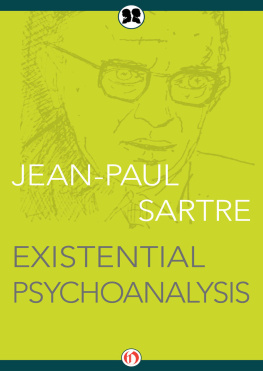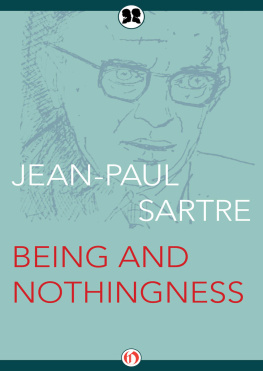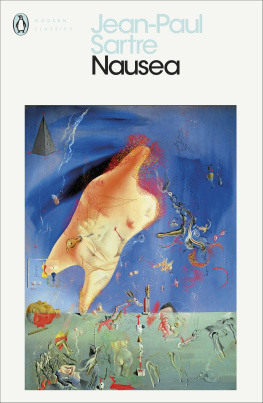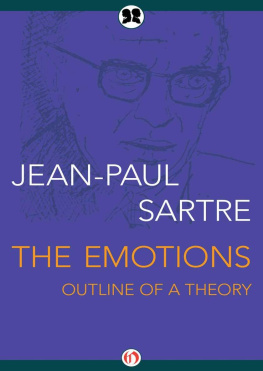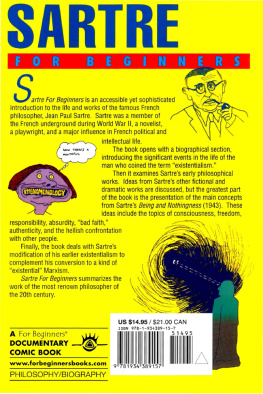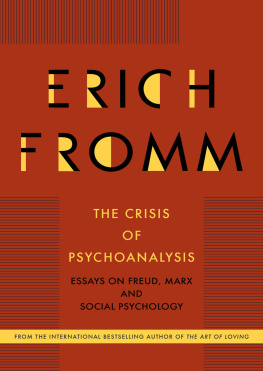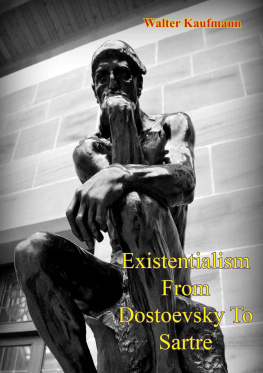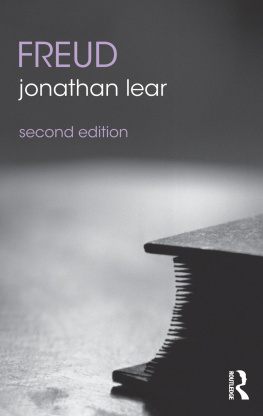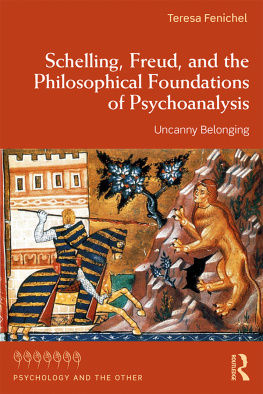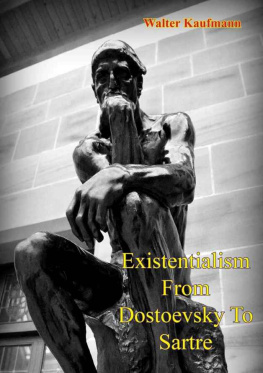Existential Psychoanalysis
Jean-Paul Sartre
Translated by
Hazel E. Barnes
Introduction by
Rollo May
Philosophical Library

TRANSLATORS PREFACE
T HE TWO essays here presented are taken from Jean-Paul Sartres Being and Nothingness (Ltre et le nant). Bad Faith is the second chapter of Part One. Existential Psychoanalysis is the second chapter of Part Four. In this volume I have reversed their relative position, for Bad Faith in actuality contains criticism and in a sense the specific application of ideas more fully developed in the other essay. Both essays contain references to other sections of Being and Nothingness. I have not deleted these since I feel that they may be useful for the reader who wishes either to consult the original or to wait for the complete translation on which I am now working.
I have included here an introduction, the intent of which is to furnish such information as will be helpful to readers who have not seen Sartres original volume.
I should like to express sincere appreciation to Professor Gardner Williams, to Professor Robert S. Hartman, and to Professor Fritz Kaufmann for helpful suggestions. In particular I wish to thank Dr. Robert O. Lehnert and Miss Doris J. Schwalbe, both of whom spent many hours reading the work with me and offering valuable criticism.
H AZEL E. B ARNES
EXISTENTIAL
PSYCHOANALYSIS
INTRODUCTION
by Rollo May
W HEN THE publishers asked me to write the introduction to this book, I hesitated because, as I remarked to them, I have two contrasting beliefs with respect to the work of Sartre. One is that his thought needs to be taken with genuine seriousness and is one of the unquestionably important contributions to modern Western mans interpretation of himself in philosophy, psychology, and literature. My other belief is that some of Sartres underlying principles are basically mistaken. The publishers answeredand I could only agree with the wisdom of their argumentthat an Introduction taking into account both these viewpoints was exactly the most constructive and fruitful way for Sartre to be presented to college students and other thoughtful modern people.
To appreciate Sartres contribution we must of course first dissociate him from the superficial interpretations of his ideas by the extremists of the Caf deux Magots and the left bank of the Seine and the Hudson. True, Sartre himself has invited such misinterpretations with such superficially rash statements as that which ends Chapter III of this book, Man is a useless passion. But behind the nihilistic implications of such a statement, there lies Sartres passionate and perdurable insistence that man is not an object to be used by God or a higher intelligence, or manipulated by the juggernaut of modern industrialism, or fashioned into a mechanical passive consumer by mass communication.
Nor is man to be used by means of his own manipulation of himself as a psychological machine to be adjusted, or moulded by Norman Vincent Peales positive thinking into an organization man to win success on Madison Avenue. Man is not an object to be forced into the role demanded by modern societyto be only a waiter or a conductor or a mother, only an employer or a worker, as Miss Hazel Barnes writes in her introduction to her translation of Sartre. She goes on rightly to say, To my mind this aspect of Sartres existentialism is one of his most positive and most important contributionsthe attempt to make contemporary man look for himself again and refuse to be absorbed in a role on the stage of a puppet theater.
All through this book the reader will find, by the same token, Sartres sharp attacks on the modern psychology which sees man as an object for conditioning, or holds that the individual is only the intersection of universal schemata. (p. 22) Sartre writes: if we consider man as capable of being analyzed and reduced to original data, to determined drives (or desires), supported by the subject as properties of an object, we may indeed end up with an imposing system of substances which we may then call mechanisms or dynamisms or patterns. But we find ourselves up against a dilemma. Our human being has become a sort of indeterminate clay which would have to receive (the desires) passivelyor he would be reduced to a simple bundle of these irreducible drives or tendencies. In either case the man disappears; we can no longer find the one to whom this or that experience has happened.
Lest any readers feel that this issue of freedom and choice is a straw man, or one of those theoretical problems the Europeans delight in coming up with, let me quote the following paragraph from a recent paper by Dr. Carl Rogers of the Departments of Psychology and Psychiatry at the University of Wisconsin:
Along with the development of technology has gone an underlying philosophy of rigid determinism in the psychological sciences which can perhaps best be illustrated by a brief exchange which I had with Prof. B. F. Skinner of Harvard at a recent conference. A paper given by Dr. Skinner led me to direct these remarks to him. From what I understood Dr. Skinner to say, it is his understanding that though he might have thought he chose to come to this meeting, might have thought he had a purpose in giving his speech, such thoughts are really illusory. He actually made certain marks on paper and emitted certain sounds here simply because his genetic make-up and his past environment had operantly conditioned his behavior in such a way that it was rewarding to make these sounds, and that he as a person doesnt enter into this. In fact if I get his thinking correctly, from his strictly scientific point of view, he, as a person, doesnt exist. In his reply Dr. Skinner said that he would not go into the question of whether he had any choice in the matter (presumably because the whole issue is illusory) but stated, I do accept your characterization of my own presence here. I do not need to labor the point that for Dr. Skinner the concept of learning to be free would be quite meaningless.
This illustrationwhich could be multiplied many times over in almost every contemporary discussion at conferencesshows that nothing is more critical and timely than just this problem of freedom and choice in American psychology. Dr. Skinner represents exactly the viewpoint which Sartre is attacking. And whereas there are many differences between Sartre and Rogers, Sartres analysis of this issue would emphatically be on the side of Rogers.
Sartre thus presents us with the most emphatic statement of human freedom and individual responsibility. I am my choices, he repeats again and again in various forms. In his seeing freedom as the central and unique potentiality that constitutes man as the human being, Sartre gives the most extreme statement of modern existentialism. In his dramas he asserts this principle continually and powerfully: Orestes, the chief character in The Flies, shouts out against a manipulating and dilettante Zeus, I am my freedom! Undaunted by Zeus reminders of the great despair and anxiety which dog the steps of the free man, Orestes cries, Human life begins on the far side of despair!
The Sartrean man, it is true, becomes a solitary individual creature standing on the basis of his defiance alone against God and society. The philosophical basis of this principle is given in Sartres famous statement, Freedom is existence, and in it existence precedes essence. That is to say, there would be no essencesno truth, no structure in reality, no logical forms, no

